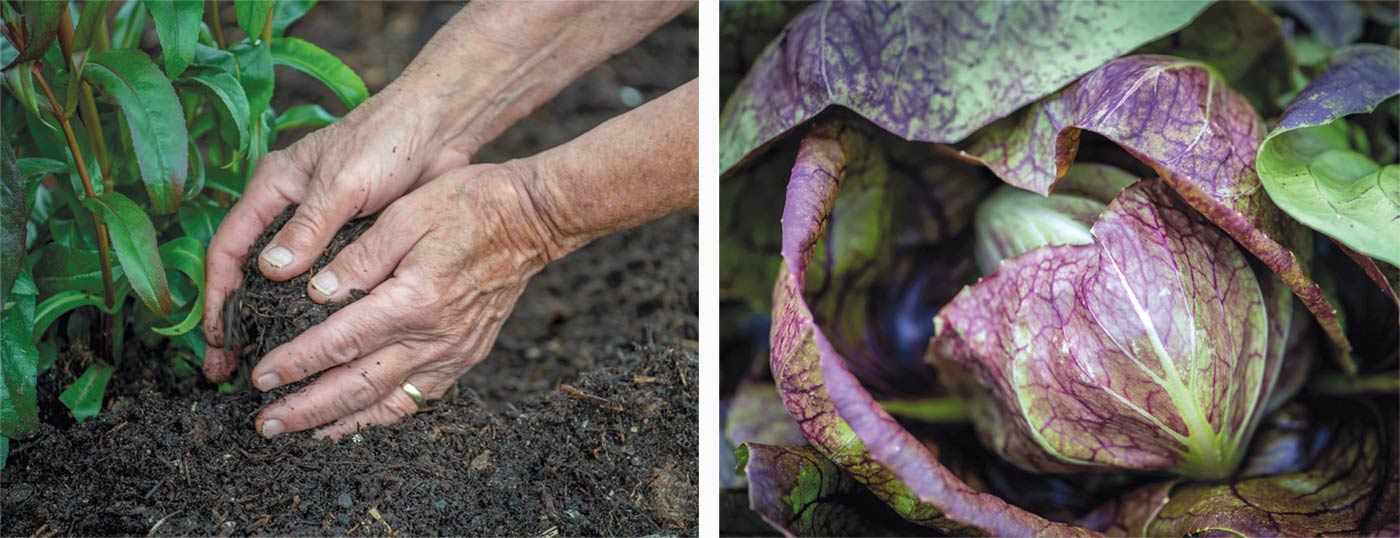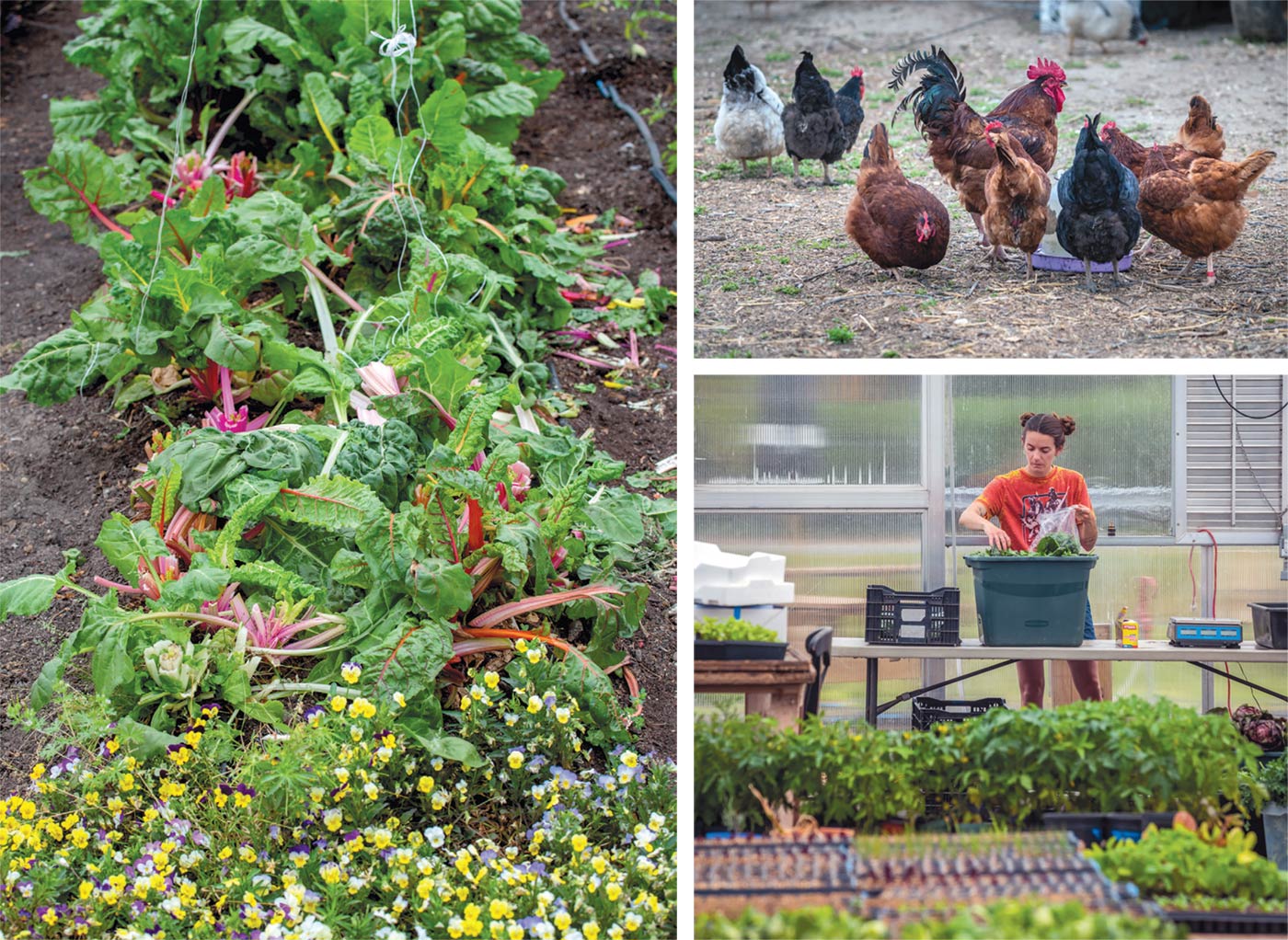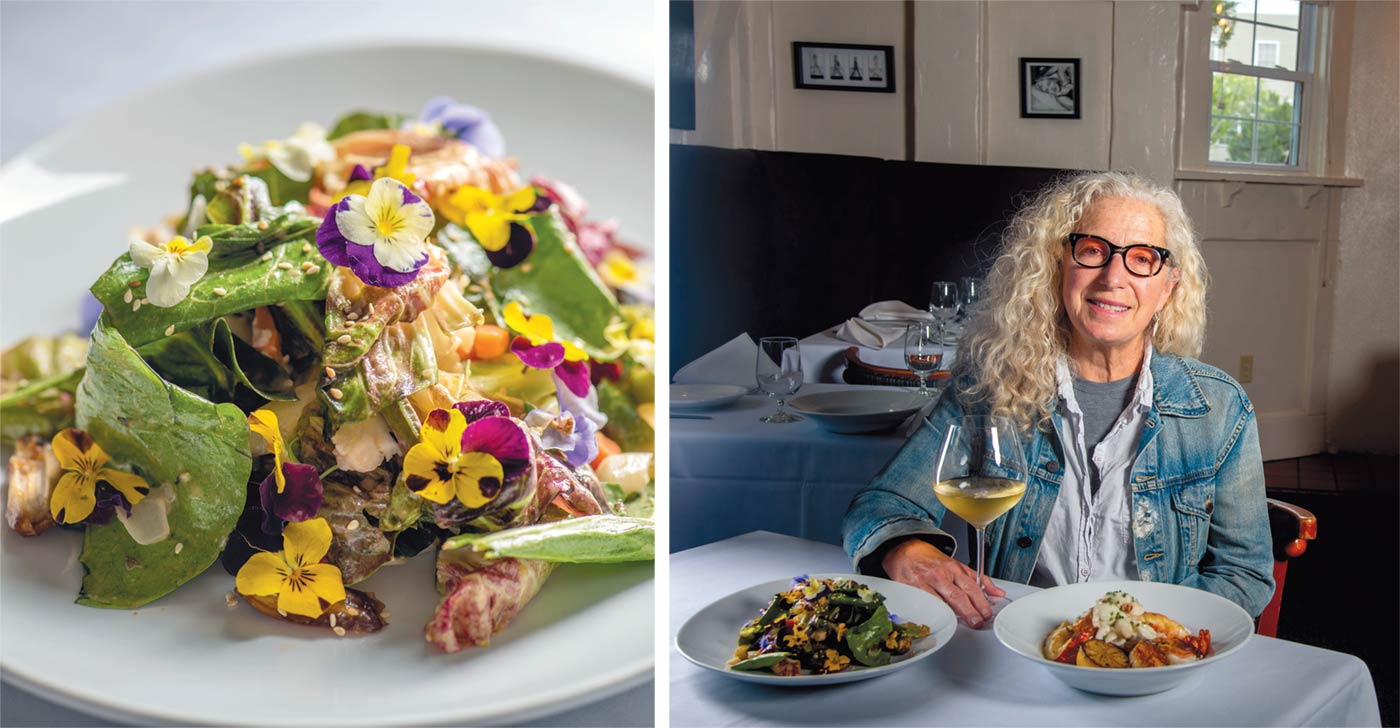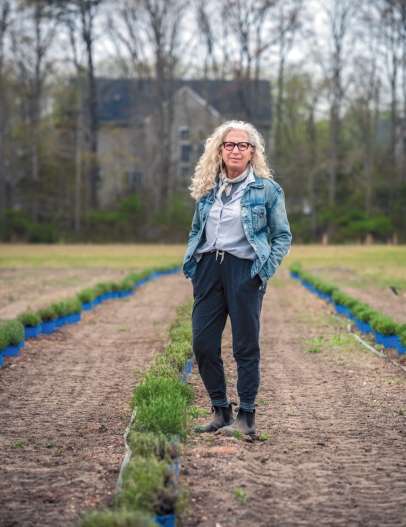Restaurateur-Farmer Cookie Till Connects the Dots between Farm, Table, and Community
Caroline “Cookie” Till has many personal stories to tell— some involving a 40-year-old former social club on the water, a brand new regenerative-agriculture farm, and three decades of blueberry pies—but she’d rather talk about everyone else. Till is the restaurateur behind Steve & Cookie’s By the Bay, a mainstay of shore dining that’s heading into its 25th year, and is nearly as legendary as Margate City’s other claim to fame, Lucy the Elephant.
The restaurant is known as a South Jersey power-broker scene and hot-ticket reservation, and Till, its doyenne, is admired locally for her involvement in youth initiatives and her nutrition-focused philanthropy. She has also been nominated twice in recent years for James Beard Foundation awards: once in 2022 for Outstanding Hospitality, and once in 2020 as Outstanding Restaurateur.
Despite all this, when asked what her food-dream is, Till always comes back to community.
The dream started when Till, an Atlantic City native with a brand new master’s in nutrition, was working in product development for the Campbell Soup Company. She loved the job, and even saw a line of salad dressings that she designed go to market. But she got together with Steve Till, the owner of a waterside restaurant in Margate called the Crab Pot. “He’d had it for 12 years,” she says, “in a really old building falling into the bay.” Soon she’d quit her job and was running the restaurant with him. He did the cooking, so she focused on baking, and became known especially for her pies. “Thirty-something years ago nobody had home-made desserts,” she says. “I started making pies, and we’re still making them now.”
The Crab Pot moved to a location on the beach, and from that vantage the couple watched as a building with “cool character” across the street, which had been a social club, came on the market, repeatedly. “This was six different restaurants,” Till recalls. “Nobody could sustain it.” Eventually Steve and Cookie bought it, renovating on a shoestring with their friends and opening in three months, just in time for Memorial Day 1998.
Today, Steve & Cookie’s By the Bay has a devoted clientele who come year after year to dine in the history-rich building’s intimate rooms or drink at one of the four bars. Steve Till died in 2005, but Executive Chef Kevin Kelly and Chef de Cuisine Warner Cristy are two of the friends who helped build the place. They turn out a notably consistent and high-quality New American menu of fresh seafood, classic dishes like meatloaf and stuffed pork chop, salads of fresh Jersey produce and an occasional innovation along the lines of cauliflower steak. The heavily in-demand pies include peach (the secret is a “custardy thing” in the filling, plus nutmeg and almond extract); strawberry-rhubarb; pecan; and that starring blueberry pie that Till personally baked every one of for almost three decades, from her mother’s secret recipe.
“It’s fun and it reminds me of my mom,” she says. “There are people online trying to figure out what the recipe is, and it’s actually so simple.”

“GETTING YOUR HANDS IN THE SOIL, AND THE WHOLE TACTILE THING, CAN BRING OUT SKILLS YOU DON’T KNOW YOU HAVE. ONE OF THE MANY THINGS I’M HOPING THE FARM COULD GROW WOULD BE MORE FARMERS.”
From the beginning, Till says, she saw the restaurant as about “so much more than serving food.” She started by nurturing employee talent—she wanted guests to “perceive the people who work here differently.” To that end, she hung an all-employee art show, and developed a devoted staff whom the diners get to know, and who return year after year. Then, many years before it was a trend, she started sourcing local ingredients for the restaurant, often driving to pick up from farmers herself. From there it was a natural step to share the wealth and bring a farmers’ market to the parking lot of Steve & Cookie’s, which happens Thursday mornings in summer, featuring as many as 40 growers and other vendors. (When the market is in session the bar at Steve & Cookie’s opens at 8:30am for additional refreshments.) Over the years her community service has grown. She created a nonprofit focused on urban gardening in nearby Atlantic City, built a commercial kitchen for the local Boys & Girls Club, and has raised money for charities including teen and workforce initiatives.
The latest manifestation of these efforts is Reed’s Organic Farm & Animal Sanctuary, a 78-acre regenerative-farming destination in Egg Harbor Township, 15 minutes from the restaurant across the Margate Causeway. The original Reed’s Farm supplied Steve & Cookie’s with produce such as corn and tomatoes, and was the closest farmland to Absecon Island, where Margate is located. Till purchased it with partners Beth Senay and Lenny Varvaro in 2020, saving it from becoming a housing development, and got it up and running at characteristic high speed. The farm now has over 15,000 plants, and will supply the restaurant, sell seedlings, run a farmers’ market, serve grab-and-go food from its own kitchen, and host an outpost of Hawk Haven Vineyard & Winery from Cape May County.
It’s also home to an animal sanctuary, an idea that came from Till’s partners but which she has embraced. It’s clear when touring the farm that she knows the name of every animal, their diet and habitat, and the story of their human caregivers. Most importantly, the farm will focus on food equity, helping underserved and marginalized people in the region through workforce development, educational programming, and alleviation of food insecurity.
The regeneration begins with the soil, Till says, which after decades of conventional farming was “dead”—fixing it was like “detoxing a drug addict.” She did so with the help of the Organic Farm Consulting arm of the Rodale Institute in Kutztown, PA. Now, two years of cover crops such as brassicas, radishes, and sunflowers have pulled many of the metals and toxins out of the earth, and the bugs and worms and other good things are starting to return.
Regeneration will also affect the people who participate in the farm’s programming. The goal, Till says, is to teach people where their food comes from and how it grows, to offer fair-labor pricing, and to invite the community in.

“Getting your hands in the soil, and the whole tactile thing, can bring out skills you don’t know you have,” she says. “One of the many things I’m hoping the farm could grow would be more farmers.”
To that end, she has initiated a relationship with the Stockton University Sustainability program. Another notable project at the farm is the Peace and Unity Garden, which sources plants from war-torn regions all over the world. The volunteer who runs it, Damon Smith, is a veteran of the war in Afghanistan, whom Till describes as “healing himself through farming.” Smith aims to use the plants to teach people about history in a participatory fashion. “The seeds are sacred to a 12,000-year-old agricultural heritage,” Till says. “By taking a seed and planting it you’re participating in the lineage of civilization.”
Till and her partners closed on the farm in March of 2020, and both her existing food businesses and the new initiative have now weathered several years of pandemic and rapid change. She’s also experienced broad shifts in the restaurant business over time.
“When we first opened Steve & Cookie’s,” she says, “the clientele was between 45 and 80 years old. You couldn’t give away a 6pm reservation, and a reservation at 8:30 was pushing it.” Now, “the millennials are so interesting,” she says. The restaurant has lines waiting outside the door at 5pm (all bar seating is first come, first served). People with small children want to dine early; older people still prefer the classic 7 to 8pm time slot; and late-night she gets young people in groups of six to eight. “They want nice wine; they order things for the table.” She takes reservations until 10:30pm.
She’s also learned a few things about training staff over the years. “One thing I learned after six, seven, eight years,” she says: “I don’t want to hire any new bartenders or new servers. People come in as glass-polishers or parking attendants and work their way up. For their sake, so they understand the restaurant, and for our sake, to show them ‘this is how we do it.’” To be clear just how, all servers must pass the test of serving dinner to Till herself.
FROM THE BEGINNING, TILL SAYS, SHE SAW THE RESTAURANT AS ABOUT “SO MUCH MORE THAN SERVING FOOD.”

During the pandemic, after an initial closure, Steve & Cookie’s pivoted to takeout, which took some time to figure out. Challenges included finding the right packaging and discovering what a slowed-down kitchen—working with fewer, properly distanced employees—could produce. Another challenge was the pace of service, which changed from putting out three courses over time to readying dinner for four people all at once. When the restaurant reopened for limited dining, Till says it was nice to have the tables spaced out, but she found it “bizarre” not to have anyone at the bar. She concludes of the pandemic: “Ninety-percent I’d just like to forget it.”
Post-pandemic, the biggest changes she sees are in lack of availability of some foodstuffs, and the high prices of supplies. There have been items like crab that she can’t get as readily at times, or that she has to remove from the menu to avoid compromising on quality. And “everything is so crazy expensive, you can’t charge what you really need to.” Fortunately for Till, she has been less challenged than some restaurateurs in terms of staffing—95 percent of her employees remained or returned.
Upon reflection, she says that a greater focus on restaurant- worker lifestyle might be a good thing to come out of the pandemic.
“In the old guard of restaurants” she says, “you worked 14– 20 hours a day, seven days a week, and people were tired and super-stressed, and took it out on each other.” The pandemic helped workers to slow down, and taught employers that “people need to be validated for what they do.”
For Till, of course, that has been a career specialty. She has showed her commitment to people through her treatment of staff, her community work, and now her new farming concern. The foundation running Reed’s Farm is called “A Meaningful Purpose”—and you could say that meaningful purpose has also been the “foundation” for her personal and professional mission through the years.
Steve & Cookie’s By the Bay
9700 Amherst Ave, Margate City
609.823.1163
steveandcookies.com
Reed’s Organic Farm
5075 Spruce Ave., Egg Harbor Township
609.457.0273
reedsorganicfarm.org
Farm market is open; kitchen opening summer 2022. Visit website for more information and to donate to A Meaningful Purpose





